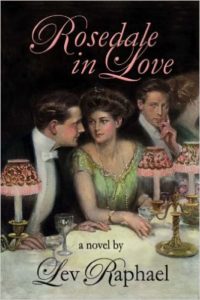Years ago when I was visiting a friend who taught at the University of Texas at Austin, she and I went to the Harry Ransom Center, a museum and Humanities library whose holdings include collections of many famous authors. My friend wanted to see something connected to the Brontes, and I was curious to see anything of Edith Wharton’s.
I had published a book about her life and fiction, as well as The Edith Wharton Murders, a comic mystery that got me my first New York Times review. Going through the index, I randomly picked a letter from Wharton to Jean Cocteau. “This should be fascinating,” I told my friend.
When the letter came in its plastic cover, it turned out to just be a note inviting him to lunch.
Years later, writing Rosedale in Love, a revisioning of Wharton’s classic The House of Mirth, I did some research at Cornell about a famous chef who was going to make an appearance in this Gilded Age novel. I was surprised that the archivist gave me a box with clippings, menus, letters haphazardly piled inside.
 That made me decide that if I ever sold my own literary papers, I’d at least supply the library with information about exactly what was in each box I gave them. And that’s what I ended up doing, starting in 1999 when Special Collections at Michigan State University bought my current and future papers, and carted off 93 boxes of materials.
That made me decide that if I ever sold my own literary papers, I’d at least supply the library with information about exactly what was in each box I gave them. And that’s what I ended up doing, starting in 1999 when Special Collections at Michigan State University bought my current and future papers, and carted off 93 boxes of materials.
So what was in those boxes? Writing diaries; travel/book tour journals; correspondence with other authors; domestic and foreign tour memorabilia; fan mail; corrected galley proofs; drafts and clippings of the hundreds of reviews I’ve published in the Washington Post and other newspapers; CDs from my radio show interviews with authors like Salman Rushdie and Erica Jong; research materials for all of my books; interviews in print and on tape, CD and DVD; editorial correspondence; reviews of my books from around the world; articles, conference papers and book chapters written about my fiction; copies of all my published books, essays, and stories in all languages; unpublished manuscripts; poetry; “association copies” (books inscribed from other authors); awards; original cover art and posters; and “ephemera” including gifts from fans ranging over thirty years of his career as a published author.
I watched all that go with a tremendous sense of relief. I was happy that future researchers would have access a collection that was so complete–and that I’d sold them at the price an editor of mine said would be fair. And glad to feel that in a way I had wiped the slate clean and was starting a new phase of my career as an author. More than that, I’d made it easier for the archivists to create an index of my work to guide future scholars and researchers.
Lev Raphael is the author of Rosedale in Love and 24 other books in genres from memoir to mystery. He teaches creative writing online at http://writewithoutborders.com

